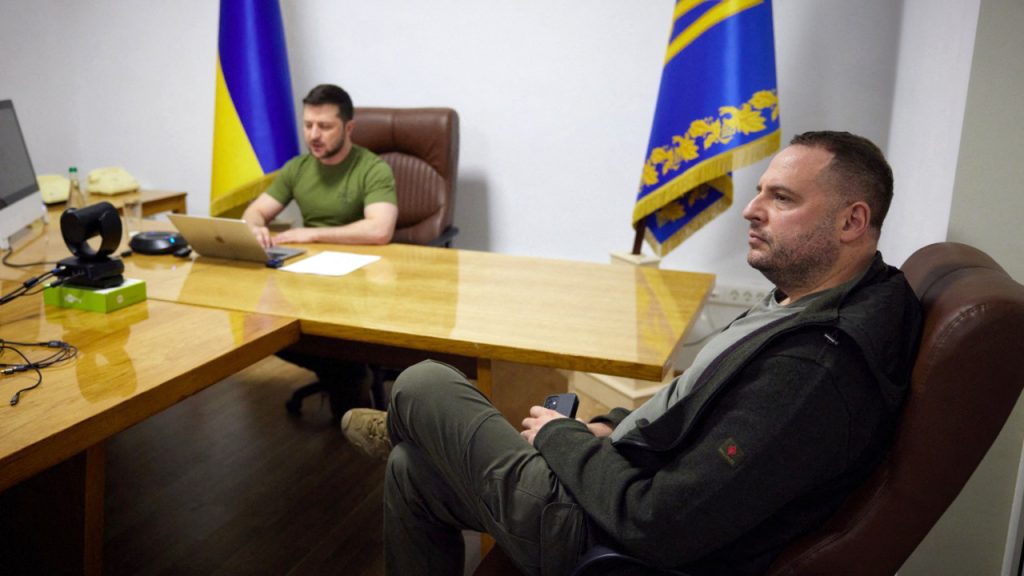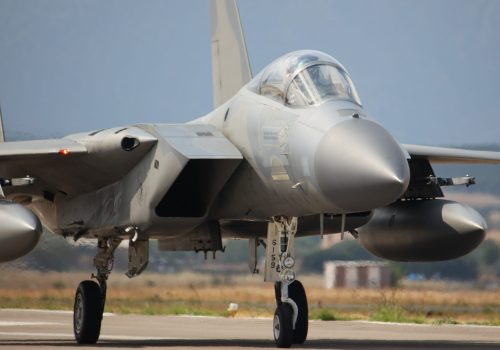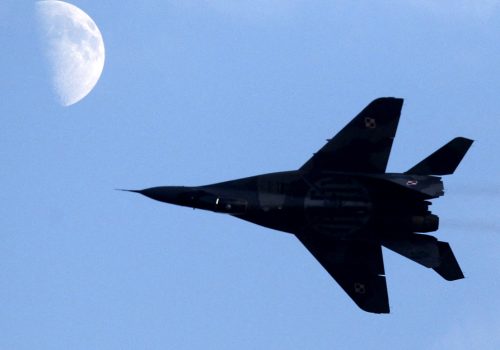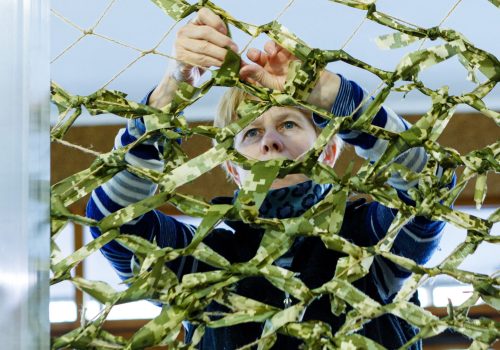One month into his country’s heroic stand against a full-scale Russian invasion, Ukrainian President Volodymyr Zelenskyy’s chief of staff says he appreciates how the West has rallied around the cause—but that it’s not nearly enough yet.
“The [NATO] Alliance is taking decisions as if there [were] no war,” Andriy Yermak said Friday at an Atlantic Council Front Page event. He added that Ukrainian officials are “very disappointed” with NATO’s current level of response following this week’s emergency summit in Brussels.
Calling for more weapons, wider sanctions against Russia, and a tougher global stance against Russian President Vladimir Putin, Yermak emphasized that time was of the essence.
Here are some more key takeaways from Yermak’s discussion with John Herbst, director of the Atlantic Council’s Eurasia Center and former US ambassador to Ukraine:
‘Sacred grail of Europe’
- Yermak cast Russia’s war on his country, which he said is “aimed at the destruction of Ukraine,” as a broader battle for the future of Western liberal democracy. Ukraine, he said, is “a sacred grail of Europe” whose fate concerns the entire continent: “Because now Ukraine is revitalizing the principle that gave birth to the current civilization of the West,” he said.
- While pledging that Ukraine would fight on for as long as it takes to secure its sovereignty, Yermak added that “we cannot allow ourselves to have a Pyrrhic victory here.” What’s more, he argued, the Ukrainian government has been forced to “repeatedly remind” the Alliance about the fact that it needs more help than it’s currently getting.
- Yermak also lamented what he described as NATO’s lingering unwillingness to provoke Moscow for fear of a larger military conflict—an instinct he said was part of a “process of appeasement.”
What Ukraine needs
- Meanwhile, Yermak rattled off a laundry list of items crucial to Ukraine’s fight: long-range anti-aircraft and multiple-launch rocket systems, greater intelligence sharing “in real time” with its Western partners, an “embargo on Russian energy,” and sanctions targeting all two million members of the Kremlin’s ruling United Russia party (as well as the journalists pumping out poisonous state propaganda).
- Responding to a question about a reported Polish proposal for a NATO peacekeeping zone in Ukraine, he conceded that such a move would lack unanimous support within the Alliance. But he added that he hopes Ukraine’s partners “are not stopping and not waiting for the Madrid [NATO] summit [in June] for new initiatives… to stop this war.”
- In a broader sense, Yermak urged Ukraine’s allies and partners “to search for a [security] format that would be longstanding and effective”—and that would also include Ukraine as a founding member. Today’s security architecture, he said, is dead. “And those who are not able to grasp it are simply blind.”
Talking tough with Russia
- Although Russia’s demands at the outset of peace talks between the two countries were “unacceptable to Ukraine,” Yermak suggested that the two sides are beginning to make progress, leading to “some perspective” of an eventual settlement. But he remained tight-lipped about exactly how Crimea and the Donbas would factor into any potential deal.
- Yet he also urged international mediators hoping to settle matters between Moscow and Kyiv to take a “very strong position” in any talks with the Kremlin. He reminded them that it’s important to remember “who started this war,” as Ukraine pushes for real security guarantees of its independence, territorial integrity, and sovereignty.
- In addition to repeatedly raising the prospect of talks between Zelenskyy and Putin, Yermak also listed the countries his government would like to serve as Ukraine’s potential new security guarantors—permanent members of the UN Security Council, Germany, Turkey, Israel, Canada, Italy, and India—which he suggested could help arrange such a meeting.
Further reading
Fri, Mar 18, 2022
A no-fly zone over Ukraine? The case for NATO doing it.
New Atlanticist By Richard D. Hooker, Jr.
The West stands at the crossroads. It's time to act by establishing a no-fly zone over Ukraine.
Fri, Mar 18, 2022
A no-fly zone over Ukraine? The case against NATO doing it.
New Atlanticist By Kelly A. Grieco
Intervening beyond providing weapons to Ukraine's military and food to the Ukrainian population would only make the nightmare worse.
Fri, Mar 18, 2022
A no-fly zone over Ukraine? The case for NATO helping in other ways.
New Atlanticist By
There’s plenty NATO member states can do to protect civilians on the ground short of shooting down Russian aircraft.
Image: Ukrainian President Volodymyr Zelenskyy and his chief of staff, Andriy Yermak, are pictured during Zelenskyy's address to the US Congress from Kyiv. Photo by Ukrinform/ABACAPRESS.COM/REUTERS



